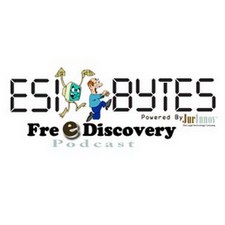- You are here:
- Home »
- Electronic Discovery »
- ESI Bytes: a web site that provides free resources on electronic discovery
ESI Bytes: a web site that provides free resources on electronic discovery
ESI Bytes is a web site (click here) that provides free resources on electronic discovery and where you can information from the top experts in electronic discovery: Judge Scheindlin, Judge Facciola, Craig Ball, Ralph Losey, Tess Blair, etc. The web site has a wealth of information.
Their purpose is simple: “Our purpose is to be a home to showcase the opinions of experts on Electronic Discovery as downloadable audio shows, better known as podcasts for free. ESI-Bytes is not about us, but about the speakers. The reason we built ESI-Bytes is to overcome a challenge national and regional electronic discovery experts have getting their opinions into the hands of their marketplace. In today’s economy, not everyone can fly to New York or Washington, D.C. to hear some of the judges or The Sedona Conference pioneers give tips on cutting edge issues within Electronic Discovery. With ESIBytes, now you can do this for free”.
They recently interviewed Tess Blair, head of the e-data group at Morgan Lewis who called the use of LPOs “a band aid” and she discussed how the change in e-discovery pricing (the “all-in” pricing model) is changing the dynamics of the e-discovery arena. She also said that law schools should “jump in now” and educate lawyers about e-discovery. Quoting part of the interview:
ESI: Are there any strategies you can think of to reduce costs in this [e-discovery] area that seem like they might be helpful?
Blair: Well, there are a number of strategies out there and I have opinions on the efficacy of a lot of them. We’ve heard; for example, talk over the last several years of off-shoring or legal process outsourcing. That addresses the labor issue. Do we want to pay contract domestic contract attorneys, or law firm associates versus, perhaps, lower cost legal professionals and others offshore – India, the Philippines, where have you, to do this work? I think that only gets us part of the way there and I actually don’t think that l.p.o. has gotten traction that I think its proponents had hoped for. I think there’s still a lot of reluctance to do that. I also don’t think it solves the problem. The problem with electronic discovery, particularly in this environment where we’re looking to reduce costs, is the problem of volume. Even if you’re paying a substantially less per hour for attorneys to review document, if you’re still looking at terabytes of documents, you’re still going to sustain a significant cost. So, I’m optimistic that some of the new technologies, the new approaches, the new cases that have come out that go to the haunt of the problem of volume, I think are really going to have an impact on cost. So, I’m optimistic about that. Also, I think that the move away from the billable hours for document review is critically important in giving our clients the transparency and the certainty that they need in managing their budgets and reducing their legal spending in this area. My firm, for one, is moving away from hourly billing. We’re doing all-in pricing for our discovery work so that they get one bill and they’re told upfront what it’s going to be when a discovery project is launched. Those two pieces are much more important than some of these other band-aid type approaches like l.p.o.
For the full interview click here.

